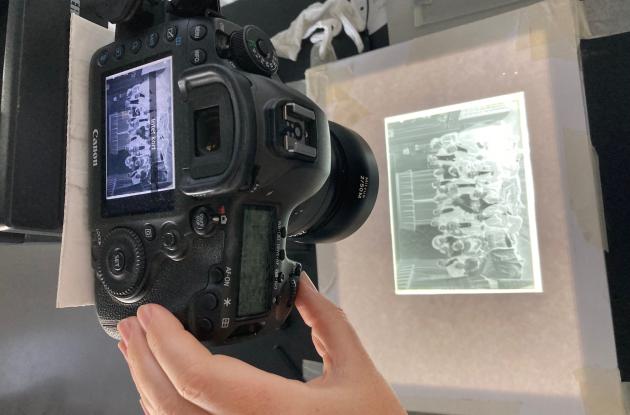Digital stories
Call for papers for the research seminar Digital stories, which takes place at Royal Danish Library 11 to 12 November 2024.

Photo: Det Kgl. Bibliotek
Published 29 August 2024 | Revision 09 January 2025
In recent decades, the digital transformation has given the cultural heritage sector a number of new opportunities, first with the retro-digitisation of physical materials and then with the emergence of increasingly large amounts of digitally born cultural heritage material. However, the technological development also entails a large number of theoretical and methodological problems, which call for critical reflection among institutions as well as researchers and practitioners within the field.
As part of the research program Cultural Heritage and Remembrance Technologies, Royal Danish Library would like to focus sharply on the opportunities and challenges that the digital development within the cultural heritage sector creates. What can we learn from the last 30 years of experience with digitisation and collection of digitally born cultural heritage, and how can this experience be mobilized in relation to future work with digital cultural heritage? We are therefore calling for contributions to a two-day seminar which addresses these challenges under two general themes.
Themes
1) Digital strategies
The digitisation initiatives of the last decades have been largely guided by institutional strategies and wishes for a wider availability of cultural heritage material. At the same time, for example, financial opportunities, the nature of the collections and the experts' priorities have also played a major role in how the digitisation has taken place. From an academic perspective, the role of the institutions has been criticised, and power structures and opacity in the decision-making processes have been pointed out.
Seen from the institutions' own perspective, in some cases it is rather about the art of possibility and the best choices within specific circumstances. This ambivalence between internal and external perspectives has rarely been played out.
Digital material promises easier and more democratic access to cultural heritage, as it requires a physical visit to a reading room to a lesser extent than before. However, this also means that the part of the cultural heritage that has not been digitised or can be digitised risks being marginalised. The easy digital access combined with increased demands for productivity among researchers and students can thus create a self-reinforcing development, so that future generations of researchers and cultural heritage users mainly orientate themselves towards digitally accessible collections. This development is reinforced by the lower prioritisation of access to physical use among the country's cultural heritage institutions.
2) Digital methods
The digital transformation is of decisive importance for how one will be able to work with source material in the future. Among other things, the development has meant that the price for digitisation has fallen, while the quality and speed of the digitisation process has increased. This has meant new opportunities for mass digitisation of, for example, large newspaper collections, register collections and photo collections. Coupled with automated and/or user-driven processes for markup (OCR/HTR) and generation of metadata, this has provided new opportunities for dissemination and research across large amounts of data as well as collection and institutional boundaries. Collection of digitally born material, as in, for example, Royal Danish Library's online archive has also opened up new methodological approaches.
Recently, AI has shown great potential in relation to streamlining the meta-dating of cultural heritage collections, but it is not a neutral technology. Many examples have gradually shown that this technology can also lead to significant bias, which risks being reproduced or reinforced by uncritical use.
Call for papers
The cultural heritage institutions' selection of what is digitised and how the material is processed and meta-dated is therefore increasingly important for how the material can be included in research and dissemination in the future. At the seminar, we want to increase the transparency of digital processes by discussing issues such as:
- What role do institutional policies and strategies play in digitisation projects?
- How is research and dissemination of cultural heritage institutions' digitisation practices shaped - and vice versa?
- What new ethical and legal challenges come with the digitisation of cultural heritage material?
- How does digital development affect the concept of work and of original?
- What does the development within AI mean in relation to the preservation and access to physical originals or the structured and documentable collection of digital cultural heritage?
- How can increased machine readability open up new research perspectives?
The seminar is aimed both at researchers who have in-depth experience with digitisation and digital collection and those who do research in and with digitised and digitally born material.
Practical information
The seminar takes place in the Blixen hall at Royal Danish Library in Copenhagen on 11 to 12 November 2024.
Abstracts of a maximum of 250 words must be submitted to digitalehistorier@kb.dk no later than 10 September 2024. Presenters will receive a reply as soon as possible thereafter. Presentations must last 20 minutes. The conference language is Scandinavian.
We are looking for fund support to be able to co-finance the trip for Nordic researchers in their earlier careers. Contact us for further information.
After the seminar, there will be an opportunity to have selected presentations recorded as articles in a special issue of the peer-reviewed journal Fund og Forskning (published at the end of 2025).